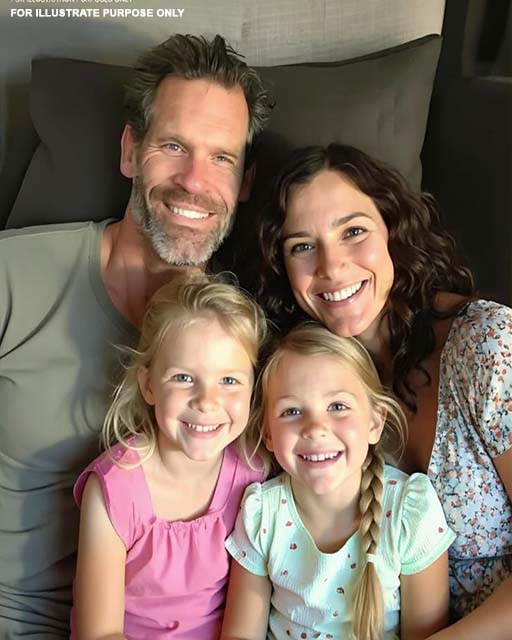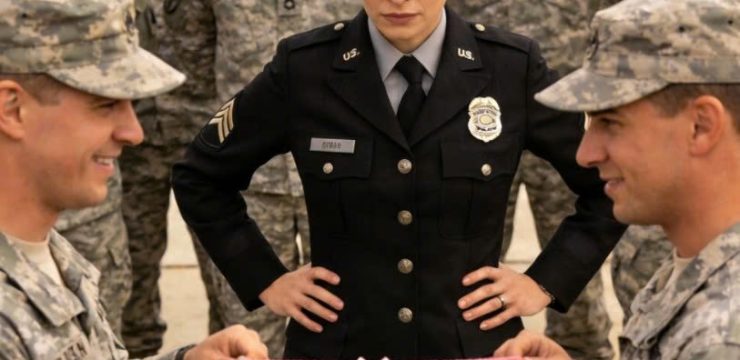When I married Rachel, I understood that I wasn’t just committing to her—I was joining a family. She came with two young daughters, Sophie and Mia, and from everything I had seen, they were full of energy, love, and joy. Rachel herself radiated warmth, with a steady, calming presence that made our house feel like a safe place from the very first day.

The home we moved into wasn’t new or flashy, but it had charm in all the right ways—polished hardwood floors that creaked just a little when you walked, cinnamon-scented candles that filled the rooms with a cozy aroma, and corners filled with the kinds of everyday memories that made it feel alive. Children’s artwork hung proudly on the fridge, their favorite books stacked on the coffee table, and the laughter of Sophie and Mia echoed through the hallways. But there was one part of the house that never felt quite right—the basement. It was just a door at the end of the hall, painted to match the wall, easy to ignore, but hard to forget. Every time I passed it, I felt a strange heaviness in my chest, a subtle discomfort I couldn’t explain. Sophie would glance at it when no one was watching, and Mia’s carefree giggles would quiet whenever her steps came too close.
Rachel never mentioned it, and I never asked. One evening, while setting the table, Rachel called out from the kitchen, asking me to grab some forks. Before I could respond, Sophie came into the room and asked softly, “Do you ever wonder what’s in the basement?” I chuckled, trying to keep the mood light, “Probably just some dusty old boxes or spiders.” She didn’t laugh—just tilted her head and walked away without a word. Later, during dinner, Mia accidentally dropped her spoon. When I bent down to pick it up, she whispered, “Daddy doesn’t like loud noises.” I paused, caught off guard. “What did you say?” I asked, but she had already returned to her meal, humming and swinging her feet like nothing happened. Rachel hadn’t shared much about her ex. All I knew was that he was “gone.” I didn’t know if that meant divorced, estranged, or something else. I hadn’t pressed her on it, figuring she’d share more when she was ready. But maybe I should’ve asked sooner. A few days later, I found Mia drawing at the kitchen table.
She was working on a picture of four stick figures. Smiling, she pointed them out: “That’s me, that’s Sophie, that’s Mommy…” Then I pointed to a fourth figure, colored in gray and placed inside a square. “And who’s this?” I asked. “That’s Daddy,” she said. “He lives in the basement.” My heart sank. That night, while we were curled up on the couch, I asked Rachel about it. She went quiet, then finally said, “He died two years ago. Cancer. It happened fast. I told the girls he was gone. They were so young—I didn’t know how to explain death.” A week later, Rachel was at work, and the girls were home with mild colds. I was making soup when Sophie appeared and said, “Wanna come see Daddy?” I turned, surprised.
“What do you mean?” Mia chimed in, holding her stuffed koala. “He’s in the basement. We visit him sometimes.” Before I could respond, they were already tugging at my hand. I followed them to the basement door. As we opened it, the air grew cooler and heavier. A flickering light at the bottom of the stairs barely lit the way. In the corner of the basement was a small table with drawings, faded flowers, and stuffed animals. At the center was an urn. “That’s Daddy,” Sophie said. “Hi, Daddy,” Mia whispered, patting the urn gently. My chest tightened. I knelt beside them, hugged them close, and said, “You’ve made a beautiful place for him. He’d be proud of you.” That night, I told Rachel. Tears welled in her eyes.
“I didn’t think they remembered. I didn’t want to forget him, but I didn’t want to overwhelm them, either.” I said, “Maybe now’s the time to bring him upstairs.” The next morning, we created a new space in the living room. The urn was placed between family photos, surrounded by new drawings and fresh flowers chosen by the girls. That night, Rachel told them, “Your daddy isn’t just in that urn. He’s in our memories, in our love, and in the way we take care of each other.” “Can we still say hi to him every day?” Mia asked. “Every single day,” Rachel promised. From that day forward, Sunday nights became “Daddy Time.” We lit a candle, shared stories, showed him new artwork, and remembered the man who had been such a big part of their lives. I never tried to take his place. My role wasn’t to replace, but to stand alongside the memory of a man I’d never met and help his daughters keep his spirit alive. Because love doesn’t disappear when someone dies—it transforms, finding new ways to live on in the spaces we make, in the stories we tell, and in the hearts of those left behind.





